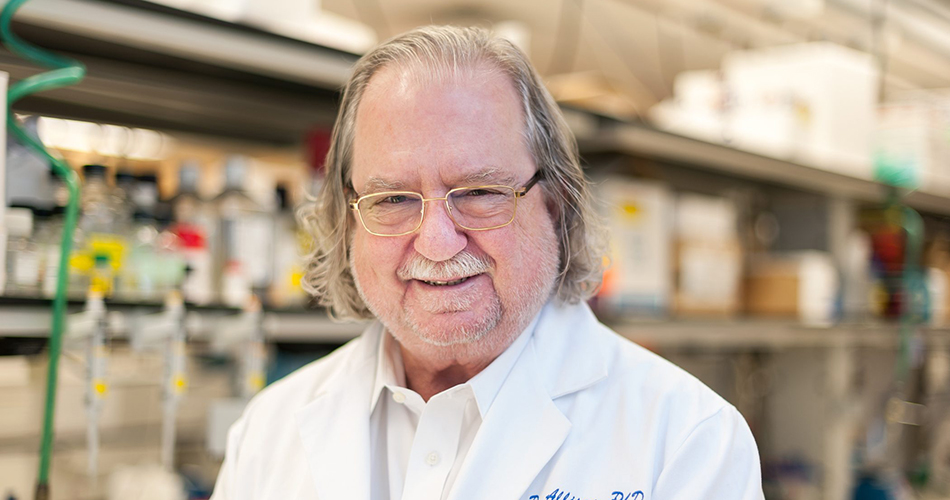
Credit: M.D. Anderson
Former Scripps Research postdoctoral associate James P. Allison wins the 2018 Nobel Prize in Physiology or Medicine
October 01, 2018
Understanding how to shut off cancerous tumors’ ability to hide from immune attack has given doctors new tools to fight cancers such as melanoma. For his discovery of how to reawaken immune system attacks on cancer, former Scripps Research postdoctoral associate James P. Allison, PhD, was awarded the Nobel Prize in Physiology or Medicine on Monday, alongside Japanese immunologist Tasuku Honjo, MD, PhD.
“Advancing the concept of immunotherapies for cancer has been an undertaking,” says Michael Oldstone, MD, professor at Scripps Research. “Allison deserves a lot of credit for bringing that therapy from the bench into humans.”
Allison trained as a postdoctoral researcher in the laboratory of noted Scripps Research immunologist Ralph Reisfeld, PhD, from 1974 to 1977. In addition to his legacy in advancing cancer therapeutics, Scripps Research scientists know him as a determined scientist and skilled mentor.
The birth of a new therapy
Allison’s innovative focus on optimizing the immune response, rather than specifically targeting tumors, proved revolutionary, says Wendy Havran, PhD, a professor in the Scripps Research Department of Immunology and Microbiology, who worked as a postdoctoral researcher under Allison at the University of California, Berkeley. “Checkpoint blockade immunotherapy has saved numerous lives and provides hope to many cancer patients,” she says.
In the 1970s, immunologists including Oldstone worked at the Scripps Clinic and Research Foundation, predecessor of Scripps Research. They focused on basic science, characterizing how the immune system recognized pathogens. They hoped to understand not only how the immune system recognized attackers, but also why the immune system sometimes becomes overzealous and attacks the body’s own cells.
Argyrios Theofilopoulos, MD, a professor at Scripps Research, recalls the intensity of the work happening on the Scripps Research campus at that time, and the steps Reisfeld and Allison were taking to advance the field.
“The institute was very famous already for our work on immunological aspects of diseases,” Theofilopoulos says. “At that time we knew nothing about T cell receptors. They were trying to identify the peptides that were presented to T cells, and thereby identify the T cell receptor.”
In 1974, Allison accepted a position working with Reisfeld, an expert on major histocompatibility complex, critical to discernment of self versus attacker. Their work focused on the interaction among proteins called human leukocyte antigens and T cells. By 1977, Allison and a colleague, G. N. Callahan, reported in a letter to the journal Nature that they had found evidence that the immune system was prevented from attacking cancer cells due to an association between pathogenic markers and additional proteins.
Finding the factors that cloaked cancer from immune attack, then developing techniques to suppress the cloaking system, eventually led to the development of checkpoint-blockade cancer immunotherapies such as ipilimumab (Yervoy). It has inspired a new generation of immunologists focused on making more types of cancer visible to immune attack, among them, immunologist Mark Sundrud, PhD, associate professor at Scripps Research in Florida.
“This highlights the life-changing implications of understanding how the immune system works at a fundamental level,” Sundrud says.
Training the next generation of researchers
Oldstone remembers Allison as a postdoctoral researcher with incredible potential, saying, “He was very smart and very determined.” Interestingly, Allison’s colleagues at the time included Rafi Ahmed, PhD, who has advanced cancer immunotherapies at Emory University, and Robert Schreiber, PhD, who has pioneered cancer “immunoediting” at Washington University School of Medicine in St. Louis.
“Scripps Research has a long history of training postdoctoral researchers for impactful careers in science. Postdocs come from all over the world to improve human health in an environment that fosters collaboration, creativity, and scientific excellence,” says Ryan Wheeler, director of the Career, International and Postdoctoral Services Office at Scripps Research.
After leaving Scripps Research, Allison moved to UC Berkeley, and went on to become Head of Immunology at Sloan-Kettering in New York. Today he is with M.D. Anderson in Texas, where he is currently Chair of Immunology.
Havran says her work with Allison continues to inspire her.
“Jim took an unexpected basic science discovery, funded by grants from the National Institutes of Health, saw the implications, and was able to translate it to the clinic to treat cancer patients,” she says. “It is every researcher's dream.”
For more information, contact press@scripps.edu

